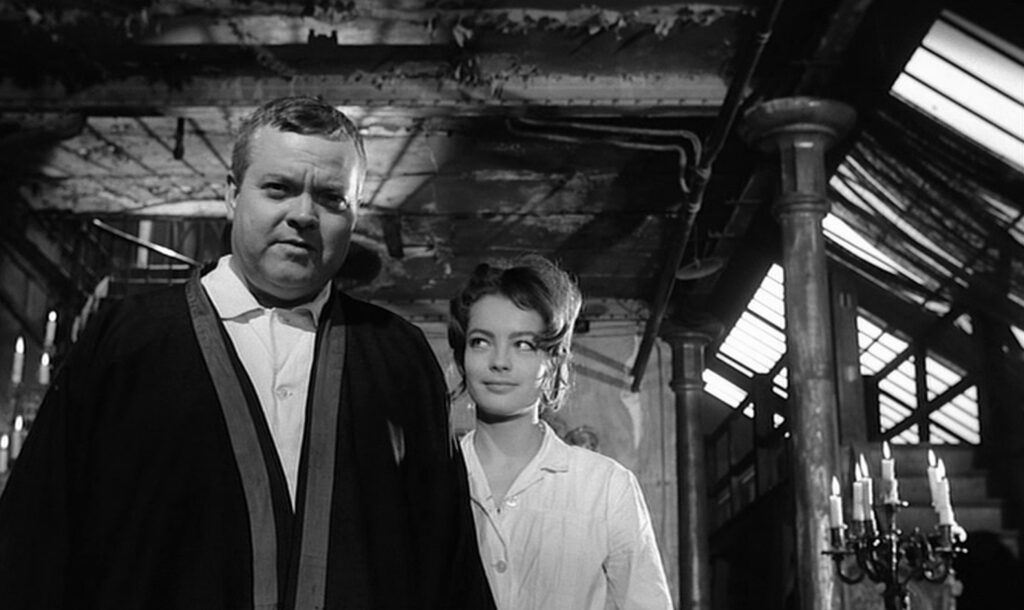
For far too long Orson Welles’ masterpiece The Trial (1962) was only available on home video in the U.S. in shoddy editions. The Trial was in desperate need of a restoration at the time and these home video releases often looked abominable. In some cases The Trial was put on DVD in the wrong aspect ratio or with the “Before The Law” pinscreen prologue cut from the film. The new 4K restoration of The Trial being released by Studio Canal through the Criterion Collection is therefore a kind of revelation.
Welles’ adaptation of the Franz Kafka novel is a tour de force in cinematographic expressionism. Space in The Trial follows a kind of dream logic rendered by Welles in tilted angles, extreme close-ups, jump-cuts, and dizzying pans. The camera is as frantic and neurotic as Josef K. (Anthony Perkins) in its recording of the highly expressionistic production design of the film. Welles took his cues from Murnau’s Der letzte Man (1924) but dressed those aesthetics up in the urban decay of post-war Europe. Welles’ The Trial is ultimately a re-imagining of Kafka’s novel as an indictment of the corruption of post-war bureaucracies.
Welles pushes the kinetic camerawork of Touch Of Evil (1958) into the highly theatrical set pieces, imbuing The Trial with all of the most disorienting and provocative aspects of the filmmaker’s style. The Trial is as submersive in its aesthetic program as it is oppressive in their effects. This two-fold cinematographic assault would, a few years later, give way to the sublime lyricism and romanticism of Welles’ Chimes At Midnight (1965). It is tempting to suggest that these explosive leaps in Welles’ style were the result of the influence of Godard or Oshima, but in reality those filmmakers merely gave Welles the attention he deserved and popularized the direction his style would take while audiences and critics were still reeling from the dramatic shifts in Welles’ artistic character since Citizen Kane (1941).
Although it goes against the popular film canon I have always felt that Welles’ films made post-1960 were his true masterpieces. No other filmmaker of his generation was ever so consistently ahead of the times or as innovative. The Trial, Chimes At Midnight, and F For Fake (1973) are unequalled achievements that Welles’ popular period in the forties does not even begin to touch. These films record one of the most original filmmakers who ever lived radicalizing his own style and discovering all of the potential the medium has to offer. The Trial, a relatively faithful adaptation of a novel, is the first leap in that stylistic radicalization.
The Trial and Chimes At Midnight are the two films that show the great experimenter Welles working on a large scale, financially equipped to render his visions appropriately and without great compromise. These films are incredibly dense in their cinematographic language, effectively disguising Welles in a familiar fiction re-told in a wholly unique way. No other director could have imagined The Trial the way Welles has, nor find their own journey as a struggling filmmaker reflected in the plight of K. so subtly that it is hardly perceptible. These are momentous works of modern art as well as intimate meditations by an artist who spent his life spellbinding audiences with the magic of the cinema.
To call a film like The Trial “surreal” or any other pedestrian buzz word is reductive to the point that it becomes insulting. The Trial draws on the schools of German Expressionism, Antonin Artaud’s Theatre Of Cruelty, and Kafka’s own urban fantasticism to create a singular filmic work that continues to explore Welles’ signature uses of deep focus, jump cuts, and Dutch angles. The effect may be “surreal” to the viewer, but on a formal level The Trial defies such easy labeling. Like its director, The Trial is many things at one to the point that classification of any kind becomes relatively meaningless.
Despite this description, The Trial, like any of Welles’ films, is not an art house picture for intellectuals. Orson Welles saw the cinema as a magic show for the masses; a great communal art that unifies all of society in a single cinematic experience of spectatorship. The Trial is not a difficult film to follow in any way. All Welles ever wanted to do as a filmmaker was to tell stories in a wholly unique way so that the audience could engage the work again and again as something new.
